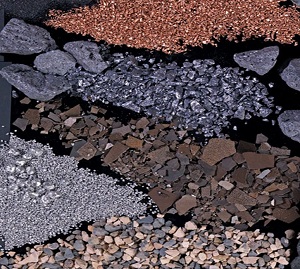Drying may be an important aspect of mineral processing; throughout the journey from ore to end product, the flexibility to manage moisture content helps to reduce shipping prices, streamline downstream process, and manufacture a refined product.
While mineral dryers could appear a similar as different industrial dryers, they’re usually designed to withstand additional rigorous demands compared to several different industries; because of the character of minerals, mineral dryers are subject to systematically harsh processing conditions, necessitating a dryer with heavy-duty components and materials of construction.
The diverse nature of minerals and associated processing techniques will demand drying at any and all stages of mineral processing, from raw ore to concentrate, all the thanks to finished product. Minerals that usually need a drying step throughout processing include:
- Alumina
- Barite
- Basalt
- Bauxite
- Borax
- Chromite
- Clay
- Ferrous minerals
- Fluorite
- Graphite
- Gypsum
- Iron ore
- Limestone
- Lithium
- Phosphorus
- Potash
- Pumice
- Magnesium
- Manganese
- Molybdenum
- Rutile
- Sand
- Silica
- Struvite
- Talc
- Vermiculite
- Zinc
Extracted ore, regardless of the mineral, is usually first crushed, and so must undergo a beneficiation process to get rid of the unwanted impurities. Beneficiation will vary considerably from one ore kind to the next. In most cases, however, beneficiation is administered through a wet process that necessitates a subsequent drying step. Mineral drying at this stage offers many advantages.
Drying raw ore makes transportation rather more economic by removing the majority of the moisture from the material, thus producers don’t seem to be paying to move water weight and may utilize fewer transportation units.
Moisture in raw material feedstock is problematic in downstream process, because it will increase the potential for build-up. Build-up successively has the potential to clog equipment, stall the operation, or maybe damaging equipment because of corrosion or abrasion. Depending on the mineral being processed, damage may be worsened by the material’s distinctive properties. Such is that the case with mineral, which might harden in place due to its cementitious nature.
In general, the less moisture content a material has, the better it’s to handle.
A moisture-rich material will wreak disturbance on the flow of operation as material moves through hoppers, bins, transfer points, conveyors, and more. Drying greatly improves material flow ability, avoiding such problems.
The extent to that a mineral should be dried is extremely variable, differing established on the kind of mineral, characteristics found at the particular deposit, subsequent processing techniques, and also the desired end product.
In addition to preparing the ore for process, drying is additionally important in manufacturing several end products, notably when the mineral are going to be pelletized for end market use.
As a post-processing step, drying accomplishes a number of objectives:
- Improved Economics
- Ensures Product Integrity
Improved Economics – As with raw ore, reducing the moisture content of the end product conjointly reduces transportation prices, still as rising storage, packaging, and handling social science.
Ensures Product Integrity – Drying is additionally essential in ensuring product integrity is maintained. each product contains a distinctive vary (or even precise percentage) at that it’ll maintain its form; too dry and also the material is more likely to degrade and cause dirt problems (attrition); too wet and also the material might foster caking or harbour mould growth. Reaching the precise moisture content for a given material ensures that the product can keep in its intended form throughout its lifecycle.
Rotary dryers are the industrial dryer of selection for mineral drying applications. Mineral drum dryer design varies supported the distinctive characteristics of the mineral to be processed. In general, however, one will assume that a dryer meant for mineral processing can meet certain objectives needed by the industry:
Materials of construction must be rugged, and carefully selected to withstand constant abrasion and corrosion.
The dryer must accommodate a high throughput.
The dryer should be manufactured with heavy components (motor, gears, bearings, etc.) to be appropriate for reliable long-term mineral processing.
Outside of those issues, the characteristics of the mineral to be processed will mostly dictate the dryer design, influencing factors like retention time, length and diameter, air flow configuration and additional. When process processing, as an example, a co-current air flow is utilized to avoid excess attrition and discolouring of the product that would occur with a counter-current configuration.
The variation in mineral varieties and characteristics usually deserves a mineral dryer testing program to assess however the material can respond to drying and subsequently, however the dryer should be designed to work best with the material.
In this setting, batch- and pilot-scale testing are conducted to assemble initial process information and scale up the method to help within the design of a commercial-scale mineral dryer. Numerous particle characteristics will be targeted throughout testing to refine the product and guarantee an best drying solution.
The ability to manage the moisture content of a mineral – whether or not raw ore or end product – is essential to the mineral processing industry, providing economic, handling, and process benefits and permitting a premium product to be produced.
Rotary dryers have proven to be an ideal industrial dryer for meeting the demanding processing conditions required by the industry.
In addition to our custom dryers, we have a tendency to additionally provide a large array of mineral processing equipment, still as batch and pilot testing capabilities for process and products design. For additional information on our mineral processing capabilities.
We at KERONE have a team of experts to help you with your need for vacuum drying in various products range from our wide experience.

